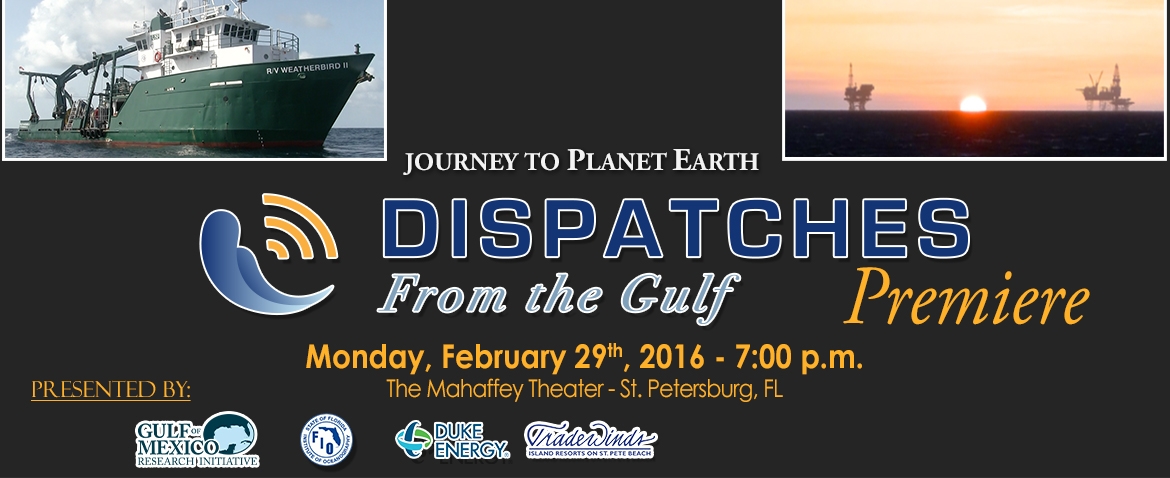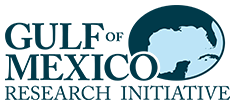
Dispatches from the Gulf Showing
‘Dispatches from the Gulf’ documentary chronicles oil research long after BP spill. Film about the 2010 Deepwater Horizon oil well disaster, produced by Screenscope and narrated by Matt Damon, explains USF’s and FIO’s critical role in documenting disaster’s impact on Gulf of Mexico.
St. Petersburg, Florida (Feb. 18, 2016) – “Dispatches from the Gulf,” a new episode in the series “Journey to Planet Earth,” (www.dispatchesfromthegulf.com) shares the first-hand accounts of scientists studying the recovery of the Gulf of Mexico in the five years since the Deepwater Horizon disaster. In 2010, the Deepwater Horizon (DWH) oil platform exploded in the northern Gulf of Mexico, killing 11 oil workers and releasing over 200 million gallons of oil over 87 days. This subsea blowout occurred nearly one mile below the ocean’s surface.
Concerned researchers with the University of South Florida (USF) with support from the Florida Institute of Oceanography (FIO) took swift action to document the impact of oil and dispersants on marine life and Gulf ecosystems in the months following the spill. Shortly after, an independent research group, the Gulf of Mexico Research Initiative (GoMRI, www.gulfresearchinitiative.org/) was established to operate a 10-year research plan following the oil spill and provided support for 15 research centers studying different aspects of oil spills. ‘Dispatches from the Gulf,’ a GoMRI funded documentary, highlights the work of these centers.
One of these centers, C-IMAGE, is hosted at USF’s College of Marine Science (www.marine.usf.edu/c-image).
Dr. Steven Murawski, Professor at the USF-College of Marine Science and Director of C-IMAGE is featured throughout the film for his work on fisheries impacted by Deepwater Horizon. “Our major focus is to see if contamination from DWH persists, and how it might have affected species and fish communities,” said Murawski. His work aboard the R/V Weatherbird II is known as ‘Mud & Blood’ for the ocean muds and fish tissues collected. “My students and I were seen sampling the fish community offshore of Louisiana in the general vicinity of the Deepwater Horizon oil spill. We have sampled this region every year since 2011 to look for oil residue in fishes and the abundance of species and communities,” Murawski said.
Amy Wallace is a Ph.D. student at the USF College of Marine Science who uses fish eye lenses and ear bones, or otoliths, to recreate the fish’s life history. Amy is a leading member of the ‘Blood’ crew and recalls working with the film crew on one hot, summer day. “Everyone was so nice and really focused on telling the full story of the science,” Wallace explains. “It was really busy when we are processing fish from our long-line catch and I hardly noticed the film crew was even there!”
The fish tell just one half of the story; the sea floor muds and sediments tell the other. Ten percent (20 million gallons) of the oil that spilled was deposited on the sea floor, impacting sea bottom (‘benthic’) communities. Dr. Isabel Romero, a researcher on the “Mud” crew at the USF-College of Marine Science studies these sediments by using layered mud cores as pages in time. “Our major objective is to see how long contamination persists in the sediments, the main oil-derived compounds that persist, and their potential impact to benthic communities,” said Romero. The areas of the ocean she studies gives insight to the ultimate fate of sub-sea oil that never reaches the surface.
‘Dispatches from the Gulf’ covers the work of three of the 12 Gulf of Mexico Research Initiative consortia, C-IMAGE (hosted out of USF), RECOVER (hosted out of the University of Miami), and ECOGIG (hosted out of the University of Georgia). The February 29th premiere is hosted by Florida Institute of Oceanography.
The hour-long film premieres Monday, February 29, at 7:00 pm at the Mahaffey Theater in St. Petersburg, FL; free tickets are available here (www.dispatches.eventbrite.com). A panel discussion moderated by Bay News 9 Al Ruechel follows the film where featured researchers and responders will discuss their work to the audience. Panel members include, Brendon Baumeister, Martin Grosell, Mandy Joye, Amy Wallace, producers Marilyn and Hal Weiner, Chuck Wilson and Steve Murawski.
Mr. Al Ruechel is Bay News 9’s senior anchor. He has won four Emmy awards for breaking news and investigative reporting and more than 20 other state and national reporting and anchoring awards.
Mr. Brendon Baumeister is the Marine Captain of the R/V Weatherbird II at the Florida Institute of Oceanography.
Dr. Martin Grosell is the lead PI and director of RECOVER. Dr. Grosell is a Maytag professor of ichthyology with specialty in environmental physiology and toxicology at the University of Miami’s Rosenstiel School of Marine and Atmospheric Sciences (RSMAS).
Dr. Samantha “Mandy” Joye is an expert in biogeochemistry and microbial ecology and works in open ocean and coastal ecosystems. Her work is interdisciplinary, bridging the fields of chemistry, microbiology, and geology.
Ms. Amy Wallace is a doctorate student at the University of South Florida, College of Marine Science studying fish eye lenses to learn about trophic shifts and migration in fish. Her research is highlighted in Dispatches from the Gulf from Screenscope, Inc.
Producers Marilyn and Hal Weiner have written, and directed more than 225 documentaries and five public television series, including “Journey to Planet Earth,” “Women at Work,” and “The World of Cooking” and won Emmy® Awards for “The Earth Summit Pledge” and “Streets of Sorrow.”
Dr. Charles “Chuck” Wilson serves as the Gulf of Mexico Research Initiative (GoMRI) Chief Scientific Officer, which provides scientific and research advice and leadership to the GoMRI. Dr. Wilson coordinates the work of the GoMRI Research Board, the GoMRI Administrative Unit, and the funded science projects to implement the research program.
Dr. Steve Murawski is a fisheries biologist and marine ecologist involved in understanding the impacts of human activities on the sustainability of ocean ecosystems. Dr. Murawski currently serves as Director of the Center for Integrated Analysis and Modeling of Gulf Ecosystems (C-IMAGE), which is funded by a grant from the Gulf of Mexico Research Initiative.
Free tickets can be accessed at dispatches.eventbrite.com.
WHEN
Monday, February 29, 2016 from 7:00 PM to 9:00 PM (EST)
WHERE
Mahaffey Theater
400 1st Street SE, St. Petersburg, FL 33701
FIO is one of Florida’s Academic Infrastructure Support Organization (AISO) established by the Florida Board of Governors (BOG). FIO is a system resource hosted by the University of South Florida, and is homeported in St. Petersburg, to provide underlying technology and resources for academic programs statewide. FIO enables entities across academia, government and the private sectors opportunities to collaborate and support excellence in marine science, technology and education through infrastructure, programs, information and people. FIO operates two sea-going research vessels, the R/V Bellows and R/V Weatherbird II and operates the Keys Marine Laboratory in Layton, Florida. The R/V Weatherbird II, a 115-foot, 194-ton vessel has become one of the nation’s most storied research vessels after its repeated voyages to carry out scientific missions in the Deepwater Horizon Oil Spill catastrophe.
The University of South Florida is a high-impact, global research university dedicated to student success. USF is a Top 25 research university among public institutions nationwide in total research expenditures, according to the National Science Foundation. Serving over 48,000 students, the USF System has an annual budget of $1.6 billion and an annual economic impact of $4.4 billion. USF is a member of the American Athletic Conference.
Journey To Planet Earth is an award-winning television series that dramatizes new ways of looking at the delicate relationship between people and the world they inhabit. It is designed to help viewers understand the complexities of the most important environmental issues of the 21st century. Through an interdisciplinary approach, these programs reach beyond the physical sciences and draw connections to politics, economics, sociology, and history.
About Matt Damon Matt Damon has been honored for his work on both sides of the camera, most recently winning a Golden Globe Award® for Best Performance by an Actor in a Motion Picture – Musical or Comedy for “The Martian.” He is nominated for an Academy Award® for Best Actor in a Leading Role for the same film. Earlier in his career, Damon won an Academy Award® for Best Screenplay and received an Oscar® nomination for Best Actor, both for his breakthrough feature “Good Will Hunting.” Damon and close friend Ben Affleck formed Pearl Street Films to create stories in film and television. Pearl Street produces “Project Greenlight” for HBO and recently co-produced the theatrical film “Promised Land.” Jennifer Todd (“Memento,” “Alice in Wonderland”) serves as President of the company, which has a first look deal with Warner Brothers Pictures. Damon is the co-founder of Water.org, a non-profit organization that works to bring safe drinking water and sanitation options to the billions of people on the planet who lack access.
Marilyn and Hal Weiner have produced, written, and directed more than 225 documentaries and five public television series, including “Journey to Planet Earth,” “Women at Work,” and “The World of Cooking” and won Emmy® Awards for “The Earth Summit Pledge” and “Streets of Sorrow.” They’ve also produced three feature films: Family Business, The Imagemaker, and K2.
The Gulf of Mexico Research Institute (GoMRI) is dedicated to investigating the effect of oil spills on the environment and public health. Knowledge accrued will be applied to restoration and to improving the longterm environmental health of the Gulf of Mexico. The Wallace Genetic Foundation focuses on improving the quality of life for all people through long-term environmental conservation. The Farvue Foundation is dedicated to finding solutions for a more sustainable environment. Downloaded photos at: http://www.screenscope.com/press.html, Press Contact: Nora Zelevansky press@screenscope.com


